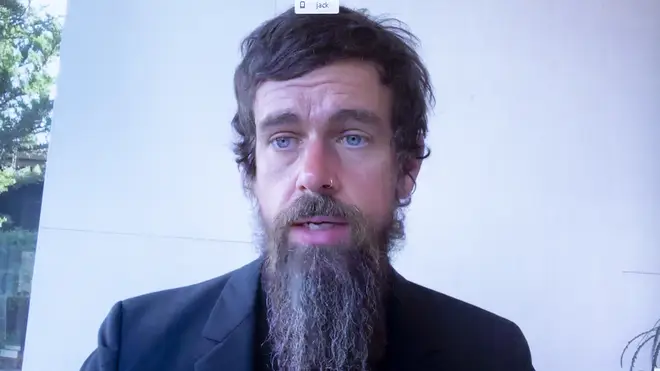
Richard Spurr 1am - 4am
17 November 2020, 15:34

Jack Dorsey and Facebook chief executive Mark Zuckerberg are giving evidence at a Senate Judiciary Committee in the US.
Twitter flagged 300,000 tweets as part of efforts to combat disinformation in the period around the 2020 US election between Donald Trump and Joe Biden, the social media site’s chief executive has said.
Jack Dorsey and Facebook chief executive Mark Zuckerberg are giving evidence at a Senate Judiciary Committee hearing called to question their companies’ actions around the closely contested election.
The senators are deeply divided by party over the integrity and results of the election itself.
Prominent Republican senators – including Judiciary Committee chairman Senator Lindsey Graham – have refused to knock down President Trump’s unfounded claims of voting irregularities and fraud, even as misinformation disputing Democrat Mr Biden’s victory has flourished online.
I won the Election!
— Donald J. Trump (@realDonaldTrump) November 16, 2020
Mr Graham, a close Trump ally, has publicly urged: “Do not concede, Mr President. Fight hard.”
Mr Zuckerberg and Mr Dorsey promised legislators last month that they would aggressively guard their platforms from being manipulated by foreign governments or used to incite violence around the election results – and they followed through with high-profile steps that angered Mr Trump and his supporters.
Twitter and Facebook have both slapped a misinformation label on some content from Mr Trump, most notably his assertions linking voting by mail to fraud.
On Monday, Twitter flagged Mr Trump’s tweet proclaiming “I won the Election!” with this note: “Official sources called this election differently.”
In his written evidence for the hearing, Mr Dorsey said: “We applied labels to add context and limit the risk of harmful election misinformation spreading without important context, because the public told us they wanted us to take these steps.”
Between October 27 and November 11, he said, about 300,000 tweets were labelled for content that was disputed and potentially misleading, representing 0.2% of all US election-related tweets sent during the period.
Of the labelled tweets, 456 were also covered by a warning message and were limited in how they could be shared.
About 74% of the people who viewed those tweets saw them after a label or warning message was applied.

Facebook also moved two days after the election to ban a large group called Stop the Steal that Trump supporters were using to organise protests against the vote count.
The 350,000-member group echoed Mr Trump’s baseless allegations of a rigged election rendering the results invalid.
For days after the election as the vote counting went on, copycat Stop the Steal groups were easily found on Facebook.
As of Monday, Facebook appeared to have made them harder to find, though it was still possible to locate them, including some groups with thousands of members.
Warily eyeing how the companies wield their power to filter speech and ideas, Mr Trump and the Republicans accuse the social media companies of anti-conservative bias.
Democrats also criticise them, though for different reasons.
The result is that both parties are interested in stripping away some of the protections that have shielded tech companies from legal responsibility for what people post on their platforms.

Mr Biden has heartily endorsed such an action.
But it is the actions that companies have taken around the election that are likely to be a dominant focus at Tuesday’s hearing.
The Republican majority on the judiciary panel threatened Mr Zuckerberg and Mr Dorsey with subpoenas last month if they did not agree to voluntarily give evidence for the hearing.
Republicans on the Senate Commerce Committee lambasted the two chief executives and Sundar Pichai, Google’s chief executive, at a hearing last month for what they said was a pattern of silencing conservative viewpoints while giving free rein to political actors from countries such as China and Iran.
Despite fears over security in the run-up to November 3 and social media companies bracing for the worst, the election turned out to be the most secure in US history, federal and state officials from both parties say – repudiating Mr Trump’s unsubstantiated claims of fraud.
Facebook insists it has learned its lesson from the 2016 election and is no longer a conduit for misinformation, voter suppression and election disruption.
This autumn, Facebook said it removed a small network of accounts and pages linked to Russia’s Internet Research Agency, the “troll factory” that has used social media accounts to sow political discord in the US since the 2016 election.
Twitter suspended five related accounts.

But critical outsiders, as well as some of Facebook’s own employees, say the company’s efforts to tighten its safeguards remain insufficient, despite it having spent billions.
There is no evidence that the social media giants are biased against conservative news, posts or other material, or that they favour one side of political debate over another, researchers have found.
But criticism of the companies’ policies, and their handling of disinformation tied to the election, has come from Democrats as well as Republicans.
Democrats have focused their criticism mainly on hate speech, misinformation and other content that can incite violence, keep people from voting or spread falsehoods about coronavirus.
They criticise the tech chief executives for failing to police content, blaming the platforms for playing a role in hate crimes and the rise of white nationalism in the US.
And that criticism has extended to their efforts to stamp out false information related to the election.